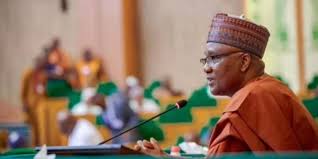Tajudeen Abbas, Speaker of the House of Representatives, has officially withdrawn the bill he co-sponsored which sought to make voting compulsory for all eligible Nigerians. The bill, aimed at amending the Electoral Act 2022, was initially co-sponsored with lawmaker Daniel Asama Ago.
The proposed legislation had been stepped down by the House on May 15, with lawmakers initially indicating that it would be revisited. However, following further consultations with stakeholders across the country, the Speaker has now opted to formally withdraw the bill from legislative consideration.
In a statement issued on Monday, May 26, Abbas clarified that the intention behind the bill was not to infringe on the rights of Nigerians, but rather to boost civic engagement and ensure more robust participation in the democratic process.
“From the outset, the bill was introduced with the best of intentions, which is to bolster civic engagement and strengthen our democracy by encouraging higher voter turnout,” he said.
Abbas pointed to examples from other countries where mandatory voting has yielded impressive results. Nations like Australia, Belgium, and Brazil have sustained voter turnout rates above 90 percent thanks to compulsory voting laws. Other countries such as Argentina and Singapore have adopted similar policies aimed at inclusivity and democratic participation.
Despite these examples, the Speaker acknowledged that Nigeria’s unique democratic journey requires tailored solutions that reflect the country’s socio-political realities and cultural context. He emphasised that any law concerning voting must respect individual freedoms and public sentiment.
“Lawmaking is ultimately about the people it serves, and any reform must respect the rights and views of citizens,” Abbas said. “This withdrawal will allow time for further dialogue on how best to cultivate a culture of voluntary participation that honours both our democratic ideals and the rights of our citizens.”
Rather than mandate participation through law, the Speaker now says his focus will shift to developing positive incentives and innovative reforms that will make voting more appealing, accessible, and rewarding to Nigerians.
Political observers had earlier expressed concern that mandatory voting might infringe on constitutional freedoms and raise enforcement challenges. Legal experts also noted that while high voter turnout is desirable, compelling citizens to vote could be counterproductive in a democratic system still working to deepen trust in governance and electoral processes.
Civic groups have generally advocated for greater voter education, electoral transparency, and improved security during elections as more effective ways to drive participation, particularly among young people, women, and marginalised communities.
Nigeria’s voter turnout has steadily declined in recent election cycles, with the 2023 general elections recording one of the lowest participation rates since the return to democracy in 1999. Several reports attributed this to voter apathy, concerns over election credibility, and logistical barriers such as distance to polling units and delays in the voting process.
The Independent National Electoral Commission (INEC) has also noted that many registered voters do not collect their Permanent Voter Cards (PVCs), a trend that continues to hinder electoral participation. Efforts by civil society and media campaigns have pushed for reforms to digitise the voting process, ensure electronic transmission of results, and make voter registration easier and continuous.
Speaker Abbas’ latest stance aligns with the broader call for inclusive and voluntary democratic engagement rather than coercion. His statement has been met with mixed reactions, with some praising the Speaker’s willingness to listen to public opinion, while others insist that Nigeria must still find innovative ways to curb electoral apathy.
Going forward, Abbas reaffirmed his commitment to strengthening Nigeria’s democratic institutions, saying that the focus must be on “making democracy work for the people, not forcing them into it.”
